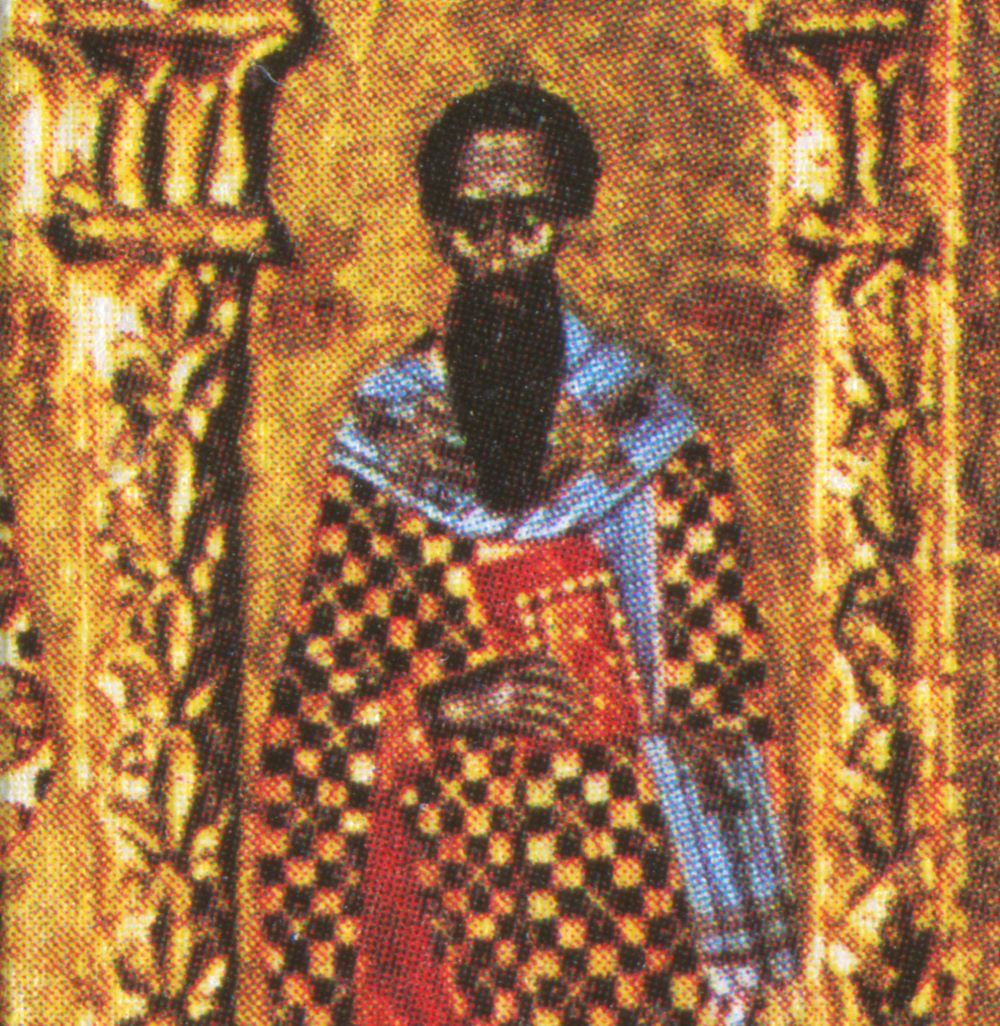“O our Father Basil, You acquired the virtues of all the Saints, the humility of Moses, the zeal of Elias, the profession of Peter and the theology of John, Paul’s unceasing pleading…” (Stichera at the Aposticha of the Feast of St. Basil)
Feast of St. Basil the Great
On the first of January, the beginning of the civil year, our Church celebrates the memory of the death of one of the greatest and most outstanding Fathers of the Church and doctors of the faith and of monastic legislators St. Basil the Great, Archbishop of Caesarea, Cappodocia, of Asia Minor (329-379). His person is in every respect extraordinary, noble, illustrious and worthy of praise. He was not only an aristocrat by birth, but also an aristocrat in spirit, character, learning and holiness. The mark of his deep faith, heroic love of God and neighbor, learning and holiness is stamped on the entire Church of Christ, on the monastic life in the East and on our people.
The French author, Jean Rivier, in his book “St. Basil, Bishop of Caesarea” says of him,
“St. Basil is one of the most illustrious and renowned figures of the ancient Greek Church. His contemporaries had already conferred upon him the title ‘the Great’… he is an ascetic by calling and a man of action by nature… His rule became the code of monastic life in the East, as did the rule of St. Benedict in the West… He is an ascetic, bishop, orator, theologian and scholar. He, without the least doubt, is the most perfect representative of the Church of his times… His life was in complete harmony with his learning, or to put it more clearly, his learning was nothing else than a reflection of his life.”
Small wonder then, that holy Church justifiably gave him the title “the Great”. He is truly “Great” especially in three areas of his life: as a great archbishop of the Church, as a great legislator of monastic life, and as a man of great holiness.
Basil Great Archbishop of the Church
The first outstanding characteristic of St. Basil as an archbishop was his fearlessness in professing and defending the holy faith against the Arian heretics who fiercely persecuted the true followers of Christ. Emperor Valens (364-379), baptized by an Arian bishop, became a relentless apostle of Arianism. Amid the inhuman and savage persecutions of the bishops and the faithful, Basil alone dared to oppose the emperor himself. Historians recorded the encounter of St. Basil with Modest, the prefect of the pretorium. He too was, like Valens, a staunch Arian. At his command, eighty-eight priests were burned at sea in a ship. Modest summoned Basil to appear before him, and received him in a most insolent manner, not even addressing him by his title of bishop. Shouting at him vehemently, he threatened Basil with exile, confiscation, torture and death. To these terrible threats, St. Basil calmly replied, “If there is anything else, threaten me with that too, for none of these things you have mentioned can affect me.” Modest afterwards reported this conversation with Basil to the emperor, saying: “My lord, we have been worsted by the head of this church. The man is superior to threats, deaf to arguments, incapable of persuasion.” After other futile attempts to persuade Basil, the emperor finally ceased to provoke him further.
From Basil’s deep faith arose his other outstanding trait – his sacrificial love of God and neighbor. Sacrifice is the language of love. In Basil, this language of sacrifice was very strong, eloquent and active. His love, ever vigilant, sensitive, open, and all-embracing impelled him to be ever ready to assist either friend or foe. For the destitute, the aged, the sick, the outcast, orphans, and widows he established large charitable institutions which formed, as it were, a separate city near Caesarea; in his honor it was called “The Basiliade”.
Basil sacrificed all his great talents, learning, energy and health for the welfare of his flock. In every way possible he defended his people against the attacks of the Arians, using every possible means at his disposal. His friend, St. Gregory of Nazianzen, mentioned this in his funeral oration on St. Basil: “Basil visited some, sent messages to others, and summoned still others; he admonished, reproved, censured, threatened, and upbraided; he assumed the defense of nations, cities, and individuals; he contrived every kind of deliverance…” (43) (Eulogy in honor of St. Basil the Great)
St. Basil was a zealous apostle of the Word of God, that is, of preaching. In his time, sermons were very important and powerful because they were almost the only means of instructing the people in the holy faith. By the grace of God, Basil was an eloquent speaker. His speech was ardent, fiery and poignant. St. Ephrem the Syrian relates that he came to Caesarea to visit St. Basil and, entering a church where Basil was preaching, he saw a white dove hovering over the shoulder of St. Basil. At this sight, he exclaimed: “Great are you, O God, in your truth. Basil is a pillar of fire through whose lips the Holy Spirit speaks.” The fiery pillar symbolizes Basil’s heroic love of God and of neighbor. For this reason, it was adopted as the symbol of his sons, members of the Order of St. Basil the Great, commonly known as Basilians.
St. Basil the Great was also a master and apostle of the written word. Although his life was short, he managed to produce a surprising variety of works. Dogmatic, moral, ascetical, and polemical works, commentaries on Holy Scripture, and 366 letters constitute his spiritual legacy.
St. Basil The Great Legislator of Monastic Life
Another area of activity in which St. Basil revealed his greatness as an unsurpassed organizer and legislator is monasticism. His name is forever inscribed in the history of monastic communities, monastic rules and the doctrine of asceticism, not only in the Eastern Church and in our native land of Ukraine, but also throughout the entire Catholic Church. St. Theodore the Studite (759-826) calls St. Basil “the father of Greek monasticism and the first of all the Fathers.” The father of Western monasticism, St. Benedict
(480-543), knew his monastic rules and benefited from them, commanding in his own Rule that the Rule of St. Basil the Great also be read.
“Of all the services rendered by Basil to the cause of monasticism,” says W. L. Clark, “the introduction of the common life is the one by which he most deserves to be remembered… The Pachomian monasteries were cenobitic only in outward appearance; their inner essence was individualistic. Basil made cenobitism a reality… He must be regarded as a pioneer in working out the ideal of the common life.” (St. Basil the Great).
According to St. Basil the purpose of monastic life is not only personal salvation, but also salvation of neighbor. For the monks of St. Basil apostolic work outside the monastery is not an exception, but a rule. According to him the love of neighbor is the measure of the love of God.
The monastic rules of St. Basil were the result of his profound knowledge of the Holy Scriptures, his great learning, his wide experience of life, his sincere holiness and eminently practical mind. His rules are, in truth, the lived reality of the Holy Gospels. St. Theodore the Studite, the great venerator of St. Basil and restorer of his rules, speaks of him thus:
“Whoever follows Basil, follows the Holy Spirit, and whoever does not have faith in him, has no faith in Christ who spoke through him.”
The Servant of God Metropolitan Andrew gives the following evaluation of the rules of St. Basil:
“After the Gospel of Jesus Christ and the teachings of the Apostles, there is no other book as authoritative for the monks as the rules of our holy Father, St. Basil.”
By his rules, St. Basil laid a lasting foundation for common life in the monastery; hence, some historians regard him as the true originator of the common life, even though this title of the first organizer is ascribed to St. Pachomius (†347). Small wonder then, that the monastic rules of St. Basil survived the various vicissitudes of history and have remained to the present day the authoritative rule in Eastern monasticism.
Monasticism made its appearance in Rus-Ukraine simultaneously with the coming of Christianity. The founders of monastic life in Rus-Ukraine were the two great ascetics and sons of Ukraine – St. Anthony (+1073) and St. Theodosius (†1074) Pechersky. As the foundation of monastic life, St. Theodosius used the rule of St. Theodore the Studite, which is based on the rules of St. Basil the Great.
The most beautiful praise in respect to the monastic rules of St. Basil was expressed by one of his great spiritual sons, Metropolitan Andrew Sheptytsky: “The saints of our Basilian Order modelled themselves on his rules. His rules were a school for a whole range of countless saints from St. John Damascene, St. Maxim, and St. Theodore the Studite to the Saints Anthony and Theodosius Pechersky and St. Josaphat, who from these rules drew that great spirit with which he renewed our Church and our people.” (Introduction to the “An Extract from the Rules of Our Father St. Basil the Great for Nuns”)
At the time of the Brest Union, the ideal of the monk-apostle in the spirit of the Basilian tradition was once more revived and began to shine forth in our country. Metropolitan V. Rutsky and St. Josaphat were the great reformers and organizers of monastic life in our Uniate Church. After the pattern of the Western monastic orders, they brought about a complete centralization of our monasteries, using the rules of St. Basil the Great as the basis of monastic life. Since that time, the work of the Order has covered three specific areas: missionary and pastoral work, education, and publications.
Although Russian Communism has brutally suppressed the Basilian Order in our native land, nevertheless, the Order has not perished. It still lives on today and its members are continuing its traditional work as missionaries, educators and publishers among our faithful who have settled in foreign countries.
St. Basil A Great Saint
The German historian, Hans von Kampenhausen, in a book entitled “The Greek Church Fathers”, speaking of St. Basil, said:
“Basil is an ascetic body and soul. Austere asceticism is the element in which he labors spiritually, lives and exists.”
According to the expression of St. Basil “monks are those who struggle for holiness.” In the introduction to his Longer Rules he says: “You and I, we have the same goal holiness of life.” As he taught, so he lived. Magnanimity, uncompromising will, angelic innocence and love of sacrifice for God and neighbor these were the distinctive marks of Basil’s character. “When St. Basil once decided on something,” says the French author, P. Humberclaude, “he pursued it to the end… Thus he remained to the end of his life… This feature of his character became evident in his asceticism.” (Ascetical Teaching of St. Basil) The British historian, F. Farrar remarked: “Basil did not belong to those who do things half way. When he consecrated himself to God, he did it without reservation.” (Lives of the Saints)
His holiness, virtues and greatness are extolled by our Church in her services in honor of his feast. Here he is praised as “the holy tongue of Christ”, “the shepherd of Christ’s Church”, “the divine and holy bee of Christ’s Church”, “royal ornament of the Church”, “a rich treasure of learning”, “invincible defender of the Trinity”. Addressing him, the liturgy proclaims, “You walked the rough road of the virtues”, “your word is angelic bread”, “you are a chalice of innocence”, “for monks a model of virtue”, “a light of piety”, and a “trumpet of theology”.
Immediately after Basil’s death, Holy Church began to venerate him as a Saint and to celebrate the day of his death on the first of January. The historian T. Rufin (+410), who eighteen years after the death of St. Basil translated his Rules into Latin, in a letter accompanying the translation addresses Basil as a Saint: “I translated,” he says, “the monastic rules of Saint Basil, Bishop of Cappodocia, a man renowned for his faith, works and every kind of holiness.”
Because the feast of the Circumcision of Our Lord is celebrated on January 1, the Latin Church honors his memory on the 14th of June, on which day he was consecrated bishop in the year 370. The church service in honor of St. Basil was composed by Anatolus of Constantinople (5c), St. John Damascene and Germanus of Constantinople (8c).
Thus we have briefly outlined a silhouette of the immortal figure of St. Basil the Great and his everlasting significance for our Church and Ukrainian monasticism. With the words of St. Paul, “Brethren, be imitators of me as I am of Christ” (I Cor. 11) St. Basil summons us all also to imitate his deep faith, his sacrificial and all embracing love of God and neighbor, and his great holiness.



